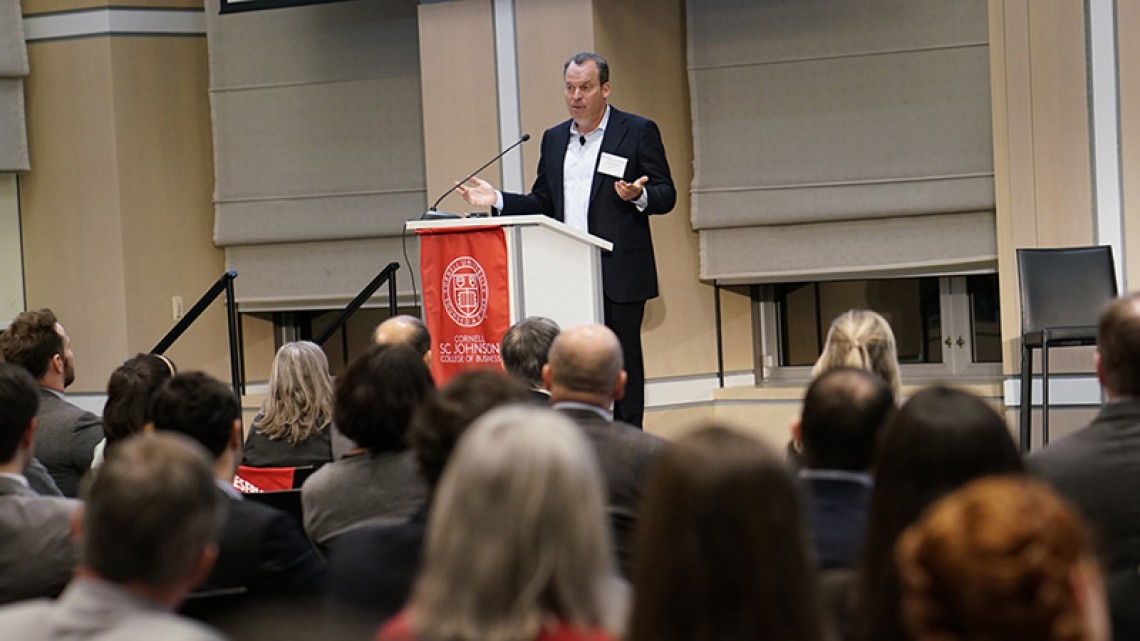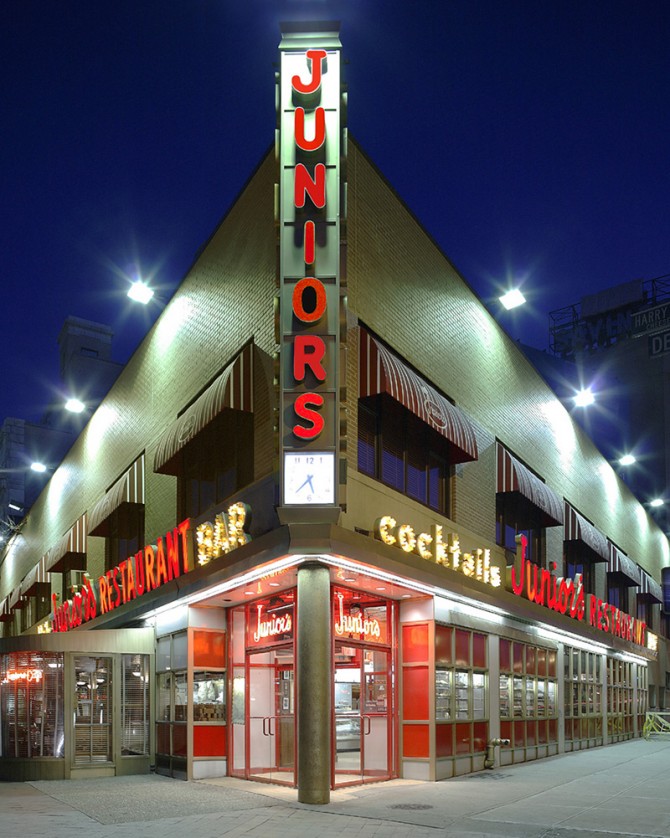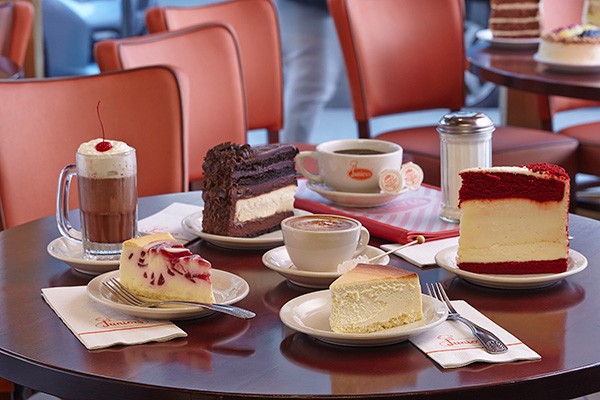
Alan Rosen ’91 speaks before alumni, faculty and deans at a Jan. 25 event hosted by the Cornell SC Johnson College of Business department of alumni affairs.
A homegrown business with billion-dollar ambitions
By Maria Minsker
In a fireside chat before alumni, faculty and deans of the Cornell SC Johnson College of Business Jan. 25, Hotel School alumnus Alan Rosen ’91 shared his journey at the helm of one of the most delicious operations in the country – Junior’s, a restaurant company famed for its cheesecake. Conversing with professors David Just and Alex Susskind at Convene in midtown Manhattan, the second-generation CEO discussed how his family business has thrived and is poised for expansion in an era of rapid change.
As a student at Cornell’s School of Hotel Administration, Rosen said, he thought he was destined to run a large restaurant chain as soon as he had his diploma in hand. After graduation, however, he managed a Chili’s restaurant, ran a nightclub in New York City and “did other things that Hotelies do” before asking his uncle for a job at Junior’s. His uncle turned him down, saying that he did not have enough experience to work for the family business. The nephew asked his uncle the same question “practically every week” until he was finally hired, essentially as a floor manager. Still, he took his position seriously and worked his way up the ranks, eventually assuming the top job.
As CEO, Rosen has grown the business, opening new locations in New York, Connecticut and Florida and developing a direct-shipping model that delivers 350,000 cheesecakes a year nationwide. He has also brought his personality to the television shopping network QVC, a move that has garnered further sales of up to 250,000 cheesecakes per year – only the beginning, he said. The company has just purchased a state-of-the-art bakery facility in New Jersey to meet demand and grow distribution. “That facility has a $100 million capacity,” he said.
As Rosen explained, technology has driven Junior’s to evolve.
Competing in today’s multi-unit restaurant space would not be possible without the networking technology that enables those units to stay connected, he noted, and robots are now automating many manufacturing tasks: “We used to have guys swirling cakes by hand and getting carpal tunnel. Now we’re buying robots for our factory.”
Consumer-facing technology is also transforming how restaurants do business. “We’re getting to a point where soon, if consumers are within 100 yards of a Junior’s restaurant, they’ll get a push notification saying Junior’s is nearby and the soup of the day is butternut squash,” Rosen said.
Other trends shaping Junior’s business include the growing spending power and influence of millennials and their propensity to seek out healthier food options. “Yes, people are eating healthier. But if they’re going to have a slice of cake, it’s going to be the best slice of cake that they can have. No millennial is going to eat a generally manufactured cheesecake, but they’ll eat a Junior’s cheesecake,” Rosen said. Millennials are also a promising cohort for Junior’s because they’re more likely to eat out than previous generations, he added.
The on-demand economy has touched Junior’s, which does business via Amazon Fresh and Jet in addition to traditional grocery stores.
While Rosen continues to learn about business, he clearly already knows a thing or two about what it takes to grow and run a successful company. With 900 employees, five locations across three states, a wholesale business in early stages of growth, solid direct-to-consumer sales, a licensing deal with potential to cover the globe, and a QVC business, Junior’s has the potential to have 20 to 40 restaurants and to become a billion-dollar brand, he said. It’s present popularity has grown organically, with little investment in marketing. “We’re a national brand with no national branding,” he said.
Challenges such as keeping up with demand, increasing distribution and identifying the best areas for new restaurant locations lie ahead for Junior’s, Rosen said.
As for a secret recipe for success, Rosen said there is none. Rather, it comes down to maintaining a classic restaurant and bakery concept with broad customer appeal, serving comfort food in a warm and inviting environment, and delivering exceptional service at landmark city locations.
His message for entrepreneurs? It’s perfectly okay for companies to hold fast to an old-school, small-business mentality as long as they have the values, tools and team to adapt to the changing forces that now shape the industry.
The event was organized by the New York chapters of the Johnson Club and the Cornell Hotel Society.
Maria Minsker '13 is a freelance writer for the Cornell SC Johnson College of Business.
Media Contact
Get Cornell news delivered right to your inbox.
Subscribe


